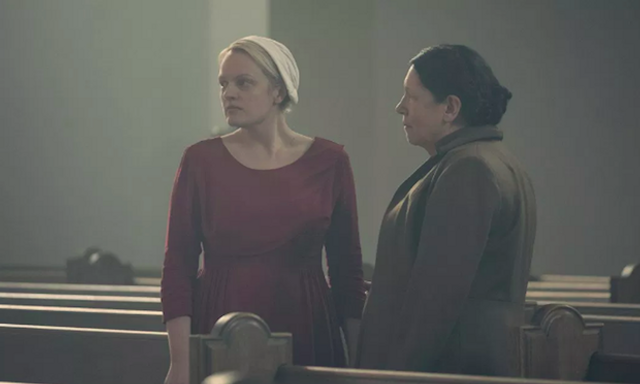The word 'Postpartum', translated from Latin, literally means 'After childbirth', and after what took place on last week's episode, it's pretty literal.
The episode opens with Serena, bathed in golden light and smiling happily, as she bathes her newborn daughter and tenderly wraps her in cotton to shield her from the mundane reality that it flits to in the blink of an eye - June / Offred, tired and pasty, being pumped of her milk by Aunt Lydia and being informed that it's not enough. This becomes a central theme of the episode, the separation of June / Offred from her daughter and the fact that she's being prevented from doing what's natural by Serena.
It's only when Fred intervenes, against Serena's wishes, that she begins to lactate once again - literally grabbing her breasts in pain when she sees the child. Serena, upon learning that June / Offred is being returned to the house, is furious and demands that she has no contact with the child whatsoever. Serena constantly refers to the child as "my child" and "my daughter", completely removing June / Offred from the equation and even arguing that her very presence will disrupt the calm atmosphere she's trying to bring the child up in.
From there, the action shifts to Emily, who's been reassigned to a new Commander after being "rejected by four households," as she's informed by Aunt Lydia. From the very get-go, Commander Lawrence - played brilliantly by 'The West Wing' alum Bradley Whitford - is shown to be different from other powerful men in Gilead. He's got artwork on his wall, his wife is nowhere to be seen initially, and even his Martha backtalks to him when Aunt Lydia's gone. It's a totally different environment from previous households we've seen in the series - until it's revealed that he's an Eichmann-esque character, the very mastermind behind the Colonies who came up with the idea of sending people out to dig up poisonous dirt - all revealed by his wife, who's explained away by him as being a troubled woman.
Whitford's performance has you on a knife's edge from the minute he turns up. There's a real air of contempt for just about everything, even when he finds Emily reading and talks about how a woman reading resulted in her losing a hand "in the good old days," before he saunters off without doing anything. It's only later on do we see that he not only knows about Emily's life before Gilead, it seems entirely possible that he requested her specifically. Whitford's introduction is obviously teeing up something big, as it seems odd to introduce a character in the penultimate episode of the season - unless, of course, it's another situation ala Marisa Tomei in the second episode, 'Unwomen'. Either way, there's more coming.
Meanwhile, back at the Waterfords, the subplot of Eden and Isaac gets wrapped up when the two decide to run away in the night - only for them to be caught a day later and sentenced to death by drowning. One of the criticisms that's been levelled against 'The Handmaid's Tale' almost since the get-go is just how miserable and how brutal Gilead is. There's only flickers here and there of hope - one scene with June / Offred and Nick in this episode in particular is truly heartbreaking - but they're so few and far between that the misery around them is almost unbearable.
It's the same here, as we see Eden and Isaac, who love one another and want to be together, forced to drown for their sins. As the two sink into the pool, you can see the other weights where others have perished - and the casual viciousness of the regime is once again made clear, and truly impacts the people forced to witness it - including Serena, who brings the newborn daughter along for some bizarre and unknown reason. What makes Serena such a complex character is that we're constantly shown two warring sides - one half of her is a hateful ice-queen who allows her husband to rape another woman and physically holds the victim down. The next, we see her doing her best for her daughter and allowing June / Offred to nurse her as she cannot.
The back-and-forth dynamic with Serena's made for some interesting drama this season, but again like so many things in 'The Handmaid's Tale', where's it going and when it's going to get better?
Episode 8 Review - 'Women's Work'
Episode 9 review - 'Smart Power'




















































































